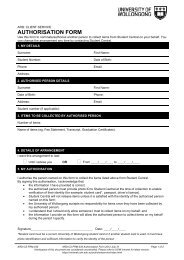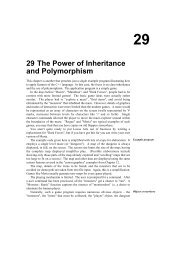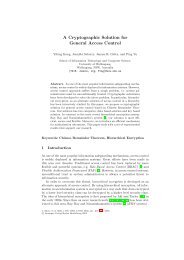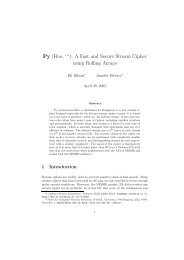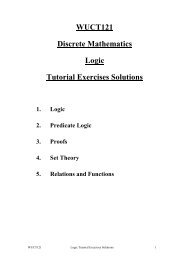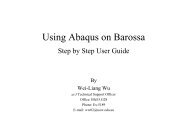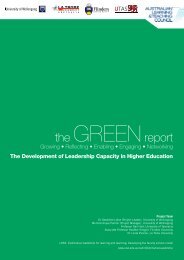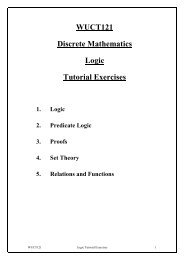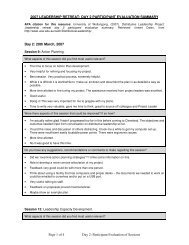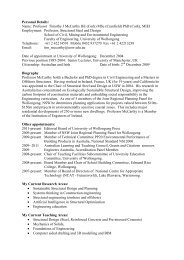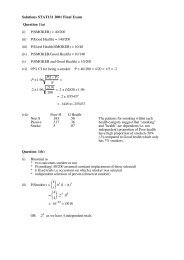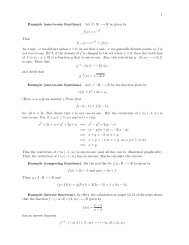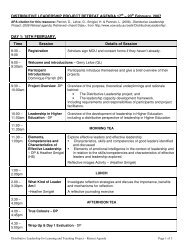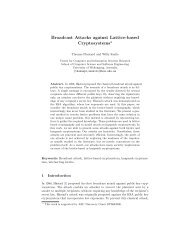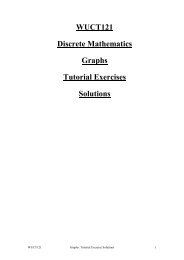india author m 1- a-nan - University of Wollongong
india author m 1- a-nan - University of Wollongong
india author m 1- a-nan - University of Wollongong
You also want an ePaper? Increase the reach of your titles
YUMPU automatically turns print PDFs into web optimized ePapers that Google loves.
Sepoy Revolt <strong>of</strong> 1857 and the role <strong>of</strong> Nana Saheb. Probes the psychological state <strong>of</strong> Saheb.<br />
Compares it to John Masters’ Nightrunners <strong>of</strong> Bengal (1969).<br />
RAJAGOPALACHARY, M. The Novels <strong>of</strong> Manohar Malgonkar: A Study in the Quest for<br />
Fulfilment New Delhi: Prestige, 1989, 102pp.<br />
RAO, D.S. "Open Season: Manohar Malgonkar" Indian Literature 24.1 (January February<br />
1981):142-7.<br />
REDDY, P. BAYAPPA, "The Novelist as Short Story Writer: Manohar Malgonkar" in<br />
Studies in Indian Writing in English with a Focus on Indian English Drama, New Delhi:<br />
Prestige Books, 1990: 52-60.<br />
ROTHFORK, JOHN. "Gandhi and Non-Violence in Manohar Malgonkar's A Bend in the<br />
Ganges" Chandrabhaga 12 (1984):41-70.<br />
SIRCAR, ARJYA. “Symbolism in Manohar Malgonkar’s The Princes” Commonwealth<br />
Quarterly 13.34 (1986-7) 40-45..<br />
Claims Malgonkar’s use <strong>of</strong> symbols is more integral than A<strong>nan</strong>d’s and others’. In The<br />
Princes symbolic moments <strong>of</strong> choice show the apparent separation <strong>of</strong> father and son to be<br />
illusory. The episodes concerning the maharani and Kamala are, however, not successful.<br />
STEINVORTH, KLAUS. "Mulk Raj A<strong>nan</strong>d's Private Life <strong>of</strong> an Indian Prince and Manohar<br />
Malgonkar's The Princes" LHY 14.1 (1973):76-91.<br />
WILLIAMS, H.M. "Manohar Malgonkar's The Captains and the Kings'" Journal <strong>of</strong> Indian<br />
Writing in English 8.1&2 (1980):35-44.<br />
Malik, Keshav<br />
BANDOPADHYAY, M. "The Poetry <strong>of</strong> Keshav Malik" Journal <strong>of</strong> Indian Writing in English<br />
2.1 (1974):58-60.<br />
IYENGAR, K.R.SRINIVASA. ""Vibrant Intensity" Indian Literature, 135, (1990): 161-64.<br />
On The Cut-<strong>of</strong>f Point review?<br />
KANNAN, LAKSHMI. "Keshav Malik: The Total Poet" in DWIVEDI, A.N ed. Studies in<br />
Contemporary Indo-English Verse Bareilly: Prakash Book Depot, 1984:152-62.<br />
RAJA, P. "All Eyes, All Ears: The Poetry <strong>of</strong> Keshav Malik" The Literary Endeavour 4.1&2<br />
(1982):51-57.<br />
Samples poems mostly from Rippled Shadow to assemble Malik’s views <strong>of</strong> poetic art as a<br />
pessimistic but unavoidable struggle to find order and understanding in chaotic life. The<br />
suffering rationalist is accompanied by the activist and the ascetic for whom poetry is an<br />
individual, direct, unpolished free-verse response to life’s variety.<br />
RAJA, P. “The Poetry <strong>of</strong> Keshav Malik” Triveni 52.1 (1983): 55-61.<br />
Quotes Malik’s views on poetry, noting his variety <strong>of</strong> subjects and viewpoints and the poems’<br />
sincerity. His poetry is an agonistic, pessimistic struggle to make sense <strong>of</strong> life, accepting<br />
mortality and advocating activist resistance to social evils and freedom <strong>of</strong> artistic expression.



